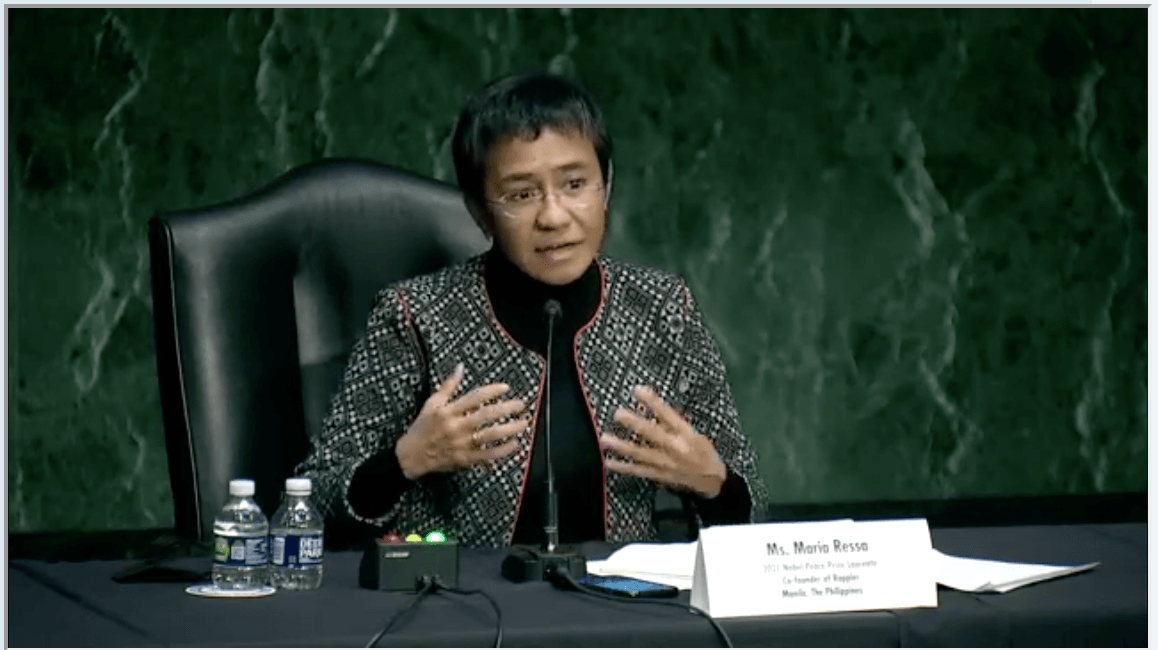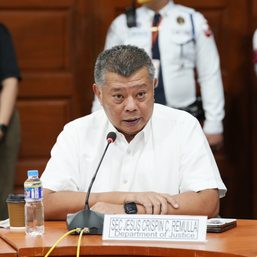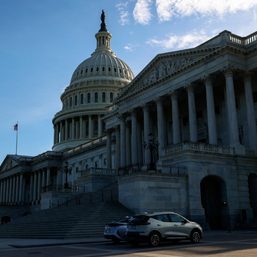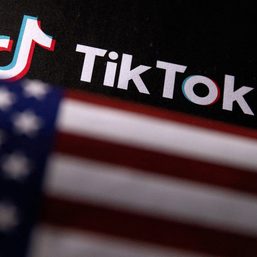SUMMARY
This is AI generated summarization, which may have errors. For context, always refer to the full article.


MANILA, Philippines – Journalist Maria Ressa called on lawmakers at the United States Senate to hold American tech companies and social media giants accountable for platforms that have “rewarded lies laced with anger and hate” over facts, calling it one of the most significant problems faced by journalists around the world.
At stake in this battle for facts is the future of democracy, Ressa warned. With algorithms destroying trust and operations carried out to monitor, analyze, and target people based on personal information, systems of tech platforms have “degraded facts and broken our societies.”
“We cannot solve the global existential problems if we don’t win the battle for facts…. The platforms – and the autocrats that exploit them – must be held accountable, and democratic governments must move faster,” said Ressa, who was award the Nobel Peace Prize in 2021.
Ressa was among three witnesses called to testify at a US Senate subcommittee hearing on Thursday, March 31 (Manila time). The Rappler founder spoke of the current state of journalists and human rights defenders in the Philippines, how technology has been used as a tool for tyranny globally, as well as Rappler’s efforts to safeguard the Philippines’ high-stakes elections in May 2022.
The testimony formed part of the US subcommittee on East Asia, the Pacific, and International Cybersecurity’s efforts to examine “The Assault on Freedom of Expression in Asia.”
Ressa has repeatedly urged government officials in the Philippines, Europe, and the US to draft legislation that will guard against the spread of misinformation and disinformation online. Calling out tech giants, the veteran journalist cautioned: “Without facts, you can’t have truth. Without truth, you can’t have trust. Without these, we have no shared reality, no rule of law, no democracy.”

‘Boon and curse’
The Philippines is a place that knows this best. For six years in a row, up until January 2022, the country was known as the social media capital of the world. Data from HootSuite and We Are Social showed Filipinos spending the most time online and on social media globally.
“For many, many years, even during the time of Yahoo, any new digital product was first tested in the Philippines. Products that are meant for the West,” Ressa told lawmakers.
Most notorious of these was the now-defunct voter-profiling company Cambridge Analytica, which harvested the Facebook data of millions of users without their permission, to target them for political campaigns. The data gathered was in turn used to develop techniques designed to influence voters.
In 2019, Cambridge Analytica whistleblower Christopher Wylie told Ressa in an interview that the Philippines was the firm’s “petri dish” where it tested these tactics of mass manipulation.
“And if they worked in the Philippines then they would – the word he used was – ‘port’ these tactics over to you,” Ressa said on Thursday. “We were the guinea pigs, you were the target,” she added. Next to the US, Wylie said the Philippines had the second largest amount of data being collected.
Ressa pressed lawmakers to tackle the operating system of tech platforms or the “algorithmic amplification” and “go further upstream to its root cause: surveillance capitalism.” “The platforms want you to debate content moderation because if you’re stuck there, they can make more money,” she said.
She added: “Engagement based metrics of these American tech companies mean that the incentive structure of the algorithms, which is just their opinion in code implemented at a scale that we could never have imagined, is insidiously shaping our future by encouraging the worst of human behavior. It is choosing what journalism survives.”
In line with holding tech platforms to account, Ressa appealed to legislators to consider Magnitsky sections and reform or revoke Section 230 of the Communications Decency Act, which protects platforms from legal liability relating to content posted on their websites by third parties. She suggested the US government could also contribute to the International Fund for Public Independent Media, an initiative to support public interest media organizations worldwide.
The promise of social media drove Ressa and Rappler’s founders to launch the online news company, though the social network is both a boon and curse. “The system doesn’t distinguish between fact and fiction. It literally rewards lies laced with anger and hate over facts so that’s our biggest problem right now as journalists,” she said.
Disinformation and lawfare
The stakes continue to grow in pushing back against the spread of disinformation online.
Asked to comment on the weaponization of law in the region, Ressa underscored how disinformation lays the groundwork for lawfare. (READ: Imprisonment of journalists worldwide at ‘record high’ – UNESCO report)
The Rappler boss herself has been the subject of harassment online and of legal cases against her in the Philippines. The news organization likewise faces at least seven active pending cases before different courts in the country. These are on top of online attacks over its reporting on the Duterte administration, including its bloody “war on drugs” and allegations of corruption among the President’s allies.
“Democratic nations must stand together for democratic values,” Ressa said. “I think we’re still at a point where we can restore that public sphere but it requires your help.”
“I could go to jail for the rest of my life. Just because I’m a journalist. But what I do now will determine whether that will happen. Now it’s up to you,” she said. – Rappler.com
Add a comment
How does this make you feel?








![[Rappler Investigates] Dangers of TikTok](https://www.rappler.com/tachyon/2024/04/dangers-tiktok-april-18-2024.jpg?resize=257%2C257&crop=309px%2C0px%2C1080px%2C1080px)





There are no comments yet. Add your comment to start the conversation.